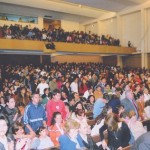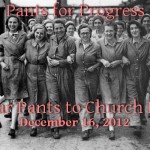This is an installment of the Religious Fundamentalism and Sexuality Project. You can read the full list of questions here and the posting plan here. The first six participants whose stories I’ll be posting are Melissa and Haley, Lina and V, Latebloomer and Katy-Anne.
Sex Education and the Body
7. What were you taught about LGBTQ issues? Looking back, what sound bites did you hear the most, and what did you think about them? Did you ever hear the term “homophobia,” and if so, what did it mean to you?
Melissa and Haley
Melissa:
When I was an older teen, I started to wonder why I was so attracted to girls. I thought that maybe every person was attracted to both sexes, and I asked my dad what it meant if someone was attracted to the same sex. He told me that homosexuality was caused by an especially disgusting demon (and he claimed to have encountered demons, so I believed him). I felt very worried, and I asked what if someone is attracted to both sexes? Hoping that the answer wouldn’t be quite as dire. He replied that the only true bisexuals were pagan witches. I knew I wasn’t a pagan witch, but I sure wasn’t going to reveal that I was sexually attracted to women! I remember hearing that homosexuals were sad broken lonely people, who were unable to have families of their own (it was horrifying to contemplate a relationship where children were not a result of sex, because fertility was so tied to sex in my mind), who never really had true relationships, who needed god. I heard homosexuality tied in with all the terrible things that happen in the world (such as rape, adultery, murder, drugs etc.) I remember some disscussion ridiculing the way gay people could have sex (insisting that it was really possible for them to have “real” sex) as well hearing gay relationships called “relationships of death” because of the possibility of anal sex (or as I remember it being refered to as “cavity of decay”). I also remember reading the accounts of Ted Haggert and others and feeling horrified. I don’t remember hearing the term homophobia while living at my parents house.
Haley:
I was taught that God made humans, male and female and that only a man and a woman were to be together in a marriage which was the only place sexual behavior should happen. People who said they were attracted to the same sex were either choosing that perversion or they were giving in to temptation. Homophobia was everywhere in my upbringing, but they would deny they were homophobes because they supposedly weren’t afraid of gay people. But that seemed to be meant on a physical safety level. Like I’m not afraid a gay person will attack me. I am not afraid a gay person will infect me with AIDS. But they were very much afraid of gay people corrupting the younger generation. I was at a wedding and one of the gay cousins talked with me and my dad swooped in on that conversation and asked me what he had been talking about. Gender was an immutable attribute determined at birth by physiology. The reality of transgender people and intersexual people was super “disturbing.”
Lina and V
Lina:
In high school, I wrote an essay slamming the Episcopal church for ordaining Gene Robinson, the first openly gay bishop. My saving grace is that, even in those days, I didn’t think the government had a business deciding who could and couldn’t marry. But the church very much had that business, and I had a bit of fear for this scary subculture of men in drag (which I couldn’t even picture). One of my most vivid memories is youth group one evening, when we were talking about AIDS (I’m guessing in connection to homosexuality) and someone asked if it was a curse for being gay: my best friend very deliberately said “AIDS is an awful, awful disease. I don’t care what kind of sin someone commits; nobody deserves to get it, ever.” That’s when I really started reevaluating a lot of my thoughts.
V:
I really can’t recall ever hearing anything explicit about gay issues. There was so much subtlety and subtext. I’m not sure I ever heard, “It’s wrong to be gay/lesbian,” as much as I heard the tone in my mom’s voice when she looked at a man in the mall and, snidely remarking, “He’s so feminine,” or “He’s gay.” One time I questioned her about it, asking her how she knew, and she said, “When you’ve seen as much as I’ve seen, you just know.”
Latebloomer:
Most of my “education” about LGBTQ issues was from volunteer work I did in my teens for anti-gay political activists like Scott Lively (author of The Pink Swastika) and Randy Thomasson (head of Save California). I heard terms like “the gay agenda” and learned about how “rabid gay activists” were fighting to “destroy family values.” I also heard how STDs, particularly HIV, were the punishment for rebellion against God’s plan for sexuality. People in those circles openly worried that the whole country was going to face God’s judgement because of its acceptance of gay people. I never heard the term homophobia, but I would have found it ridiculous because in my mind I was simply hating the sin while loving the sinner….from a great distance, of course, because I didn’t want to get HIV. I did hear the word tolerance a lot, but it was usually ridiculed as the easy way, the way to get the world’s approval by denying God’s Word.
Katy-Anne:
I can’t say I was taught anything about LGBTQ “issues” because in fundamentalism, the “issue” is the LGBTQ person. They are an abomination, they are disgusting, they are perverts willfully rebelling against God, according to the fundamentalists. So I have had to purposely educate myself about LGBTQ issues and talk to those that are LGBTQ and have conversations about the issues, and they have been very informative. I find that LGBTQ people are quite happy to talk about the issues they face if someone is genuine in wanting to understand them. I think we should all talk to each other more about issues we face…from LGBTQ issues, to addiction issues, to differences in culture. Diversity is a wonderful thing and I think we should all care enough about others to find out at least a little bit about the issues they face and what life is like from their perspective.











